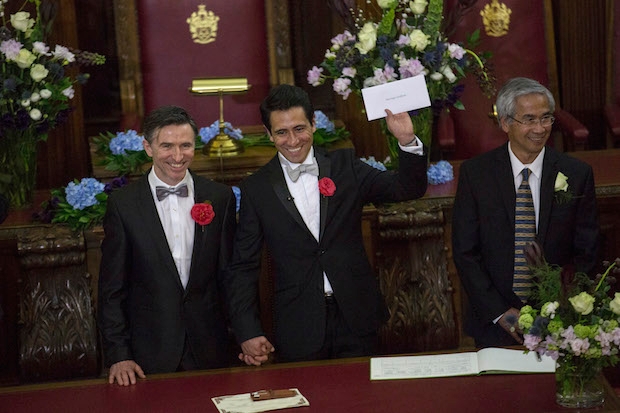Well, Peter and David, John and Bernado, Sean and Sinclair are now married and the happy husbands have the further benefit of the unanimous blessing of our political class.
David Cameron said the move sent a message that people were now equal ‘whether gay or straight. It says we are a country that will continue to honour its proud traditions of respect, tolerance and equal worth.’ For good measure, he added that the law change would encourage young people unsure of their sexuality. Really? You mean a few more teenagers hovering between being gay or straight might go for the gay option on the back of the prospect of a wedding? And that’s a good thing?
Liberal Democrat leader Nick Clegg said ‘Britain will be a different place’ as a result:
“If our change to the law means a single young man or young woman who wants to come out, but who is scared of what the world will say, now feels safer, stronger, taller – well, for me, getting into coalition government will have been worth it just for that.”
Well, Britain is a different place all right but not necessarily a better one. What we’ve been reminded of is the arrogance of our political class who drove through a change for which there was, at the beginning of this parliament, no popular demand and certainly no mandate from the electorate.
If David Cameron was so convinced of the necessity of gay marriage, perhaps he could have taken the trouble to put it in the manifesto…because an awful lot of people who did vote for him wouldn’t have done so if they’d only known. He was responding to opinion in his own milieu, at least that of his own generation – by all accounts he couldn’t convince his own mother. But he knew best, and railroaded his own party – with only partial success – into it. And at a stroke, the fundamental character of marriage – grounded in the difference of the sexes, necessary for its procreative aspect, more or less the same over human history – has been obliterated. Burke would have known what to make of it.
Certainly popular opinion has changed over the course of the debate but that’s not least because of the coverage of all this by the broadcast media, which has presented the gay marriage as a nice good news option, not as a calculated reworking of the most important social institution there is. There was rather little space given to the working class view, sotto voce, view that it’s not really natural. But that’s represented in the awkward response to polls asking whether gay and straight marriage is on a par: 44 per cent of people do not.
It seems not to occur to the BBC that ordinary people, not particularly religious, might find the prospect of gay weddings not wholly inviting, and not because they’re religious. But broadcasters have expressed opposition as the preserve of ‘religious groups’ and ‘some’ Tory MPs. There’s more out there, you know.
Naturally Labour leader Ed Miliband congratulated the gay spouses:
‘This is an incredibly happy time for so many gay couples and lesbian couples who will be getting married, but it’s an incredibly proud time for our country as well, recognising equal marriage in law’.
The bright side is that it’s lovely that Ed Miliband has got round to appreciating the signal importance of matrimony, given that he only hastily and belatedly married Justine after becoming party leader (Though that pales by comparison with the performance of Francois Hollande, who pushed through same sex marriage despite his unwillingness ever to engage in it himself.) Indeed the importance of marriage seems only really to figure for him in extending it to gay people.
What all this goes to show is that there is indeed a remarkable homogeneity in our political class. Tolerant — in some ways — certainly; arrogant, without question.







Comments